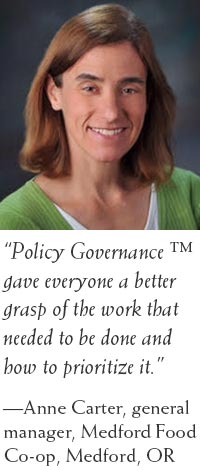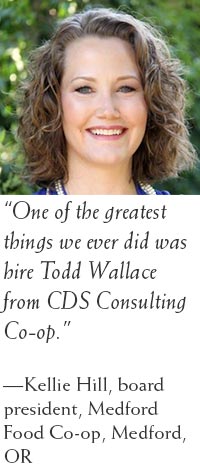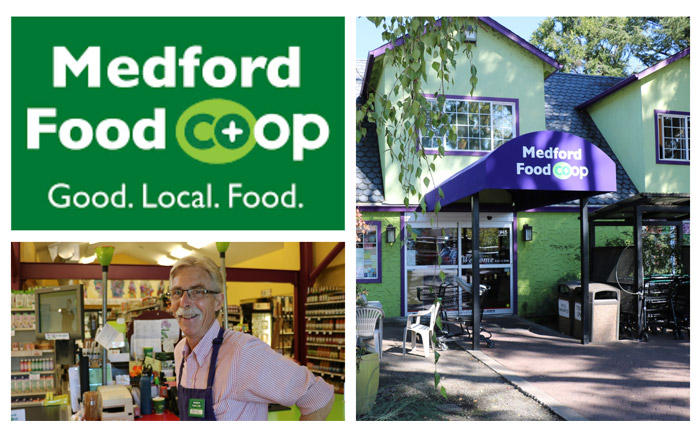Medford Food Co-op
Medford, OR
Year founded: 2011
Member investment: $100
Number of members: 3,200
Number of employees: 35
Retail square footage: 4,300 + 700 off-site café
When Anne Carter came to Medford Food Co-op in Medford, Oregon, the startup co-op had been open for two years and was still establishing its operations and governance. Their internal situation was mirrored in the community-at-large. Medford was once a logging town, and the current 225,000 inhabitants were transitioning their economy to tourism and business services. That new dynamic, and a focus on health and sustainability, also led to the creation of the food co-op.
 Carter had prior experience working in a mining town with a similar changing economy (Natural Harvest in Virginia, Minn.) as well as with establishing good governance at her former co-op. She thought her experiences might help the board navigate the transition. “I appreciated the structure Policy Governance ™ offered and talked about it with the board. They were very interested and went with it. That was an important factor in our success, they were interested in a system that had a well-defined role for the board.”
Carter had prior experience working in a mining town with a similar changing economy (Natural Harvest in Virginia, Minn.) as well as with establishing good governance at her former co-op. She thought her experiences might help the board navigate the transition. “I appreciated the structure Policy Governance ™ offered and talked about it with the board. They were very interested and went with it. That was an important factor in our success, they were interested in a system that had a well-defined role for the board.”
Because the co-op was a startup and didn’t have many systems in place, the board and Carter worked very hard that first year to get policies and monitoring reports established. “We all knew the business was still being established, and people were understanding. There was a ton of reporting that first year. But it gave everyone a better grasp of the work that needed to be done and how to prioritize it.” Once the systems were in place, things worked a lot smoother after that.
“Now that it’s well-established, it has set the process for the board’s work. When the board brings new people on, they are introduced to the process and how it functions.” Carter sees that benefiting not just the board, but her own work too. “It’s easier for them to see the role of the board with monitoring reports. Now that it’s ingrained communication, there is the ability to focus on other areas, too.”
Although the co-op is under 10 years old, they are already poised to expand, and Carter finds that having an established board process is allowing them to build their own internal capacity to address it. “A benefit of our process is that the board can feel confident that they can fulfill their fiduciary role and take on a bigger project.”
Carter also gives kudos to her board president for maintaining this atmosphere of trust. Kellie Hill is the co-op’s current board president and she had been involved as a board member since before it opened. Hill said, “Policy Governance ™ really helped the board-GM relationship. Things were different before policy governance, the general manager didn’t know what the board wanted or needed, and it made everyone uncomfortable.”
 Hill also said the board had trouble staying on track as well. “We used to have long and frequent meetings, now we don’t have to. There’s been a shift in the board presidency in terms of managing the board’s time. With monitoring reports, we get that accountability we were searching for.” She said one major benefit to that is a “no surprises” communication approach. “We know what will happen at the meeting and it gives the general manager time to prepare.”
Hill also said the board had trouble staying on track as well. “We used to have long and frequent meetings, now we don’t have to. There’s been a shift in the board presidency in terms of managing the board’s time. With monitoring reports, we get that accountability we were searching for.” She said one major benefit to that is a “no surprises” communication approach. “We know what will happen at the meeting and it gives the general manager time to prepare.”
“One of the greatest things we ever did was hire Todd Wallace from Columinate Co-op. Todd is instrumental in our success. We have a partner with so much experience. He made it exponentially easier to do things.” Hill said. “Now we put it in the budget to train board members and we go to all the consulting co-op events.”
Both Carter and Hill invest time in their relationship by holding regular meetings with each other. Hill said taking the time to do this has resulted in board conversations that are more strategic, and the importance of that can’t be overstated. As they consider an expansion or potential relocation, they wanted to be sure that they stayed focused on their goals. Carter said, “It’s very time-consuming running a co-op and keeping it successful, there’s a lot of competition out there and it’s not a job for everyone—board or management. That’s why our relationship and communication needs to stay strong.”
Have more questions?
Get in touch with one of our consultants.

